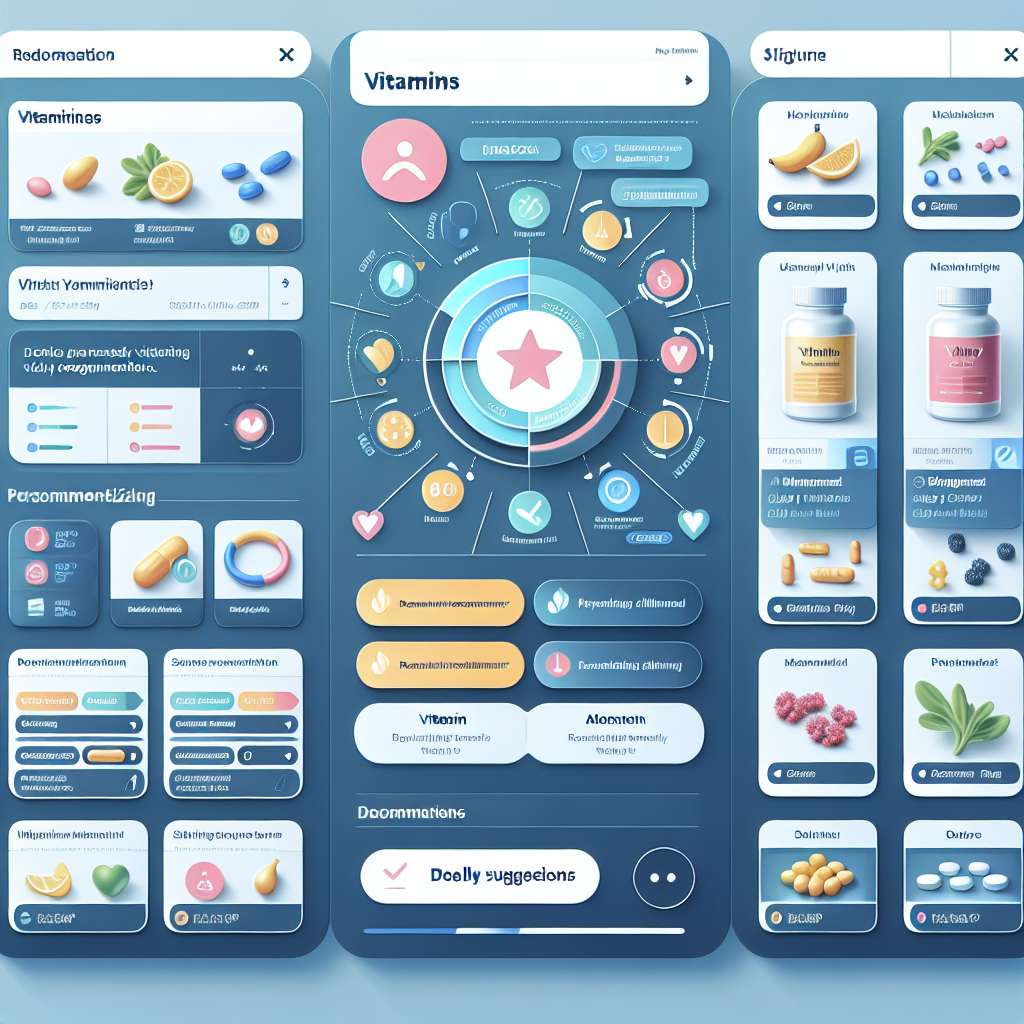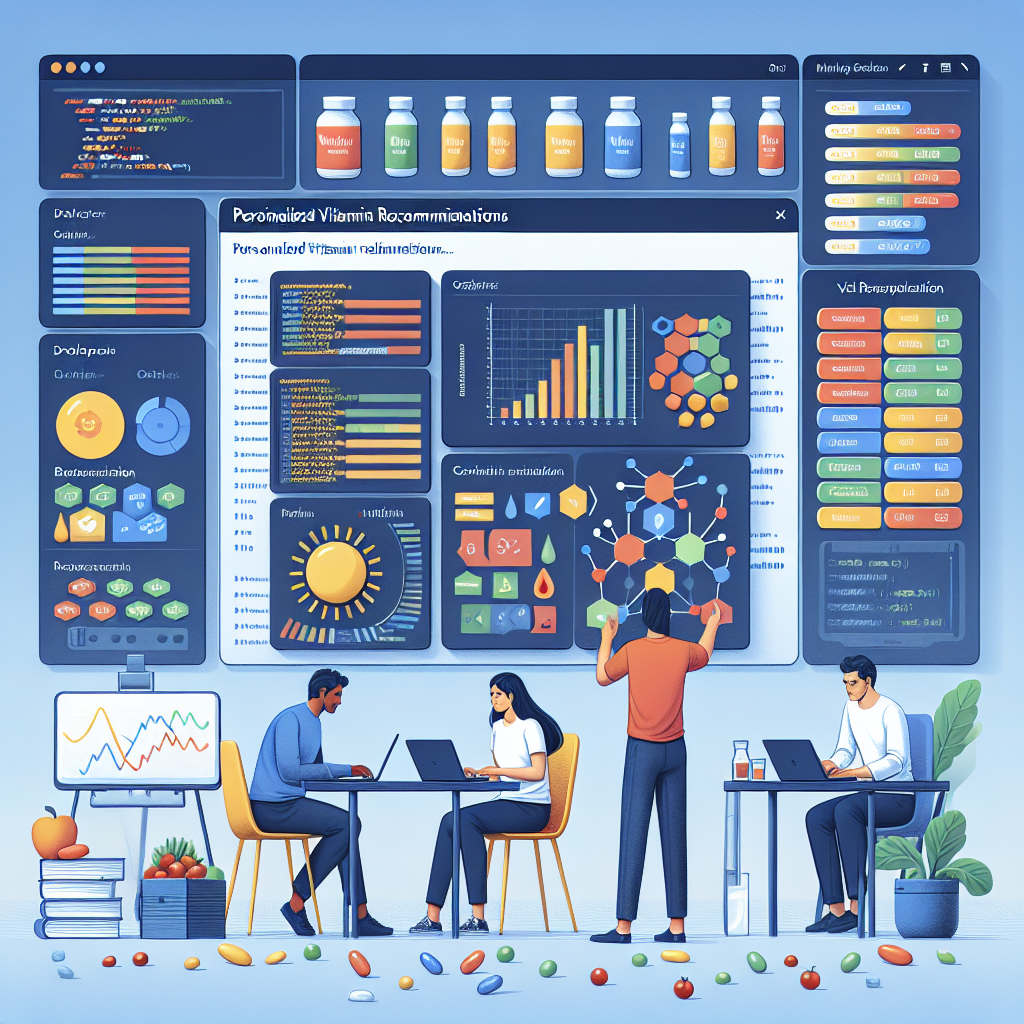Coding Solutions for Personalized Vitamin Recommendations

Discover the power of personalized vitamin recommendations through our innovative coding solutions. Start your journey towards better health today. Click here to learn more.
Exploring Coding Techniques for Personalized Vitamin Recommendations
The advent of technology has revolutionized various sectors, including the health and wellness industry. One of the most intriguing advancements is the use of coding solutions to provide personalized vitamin recommendations. This innovative approach leverages the power of algorithms and data analysis to offer tailored nutritional advice, thereby promoting optimal health and wellness.
The process begins with the collection of data. This data can be derived from various sources such as health history, lifestyle habits, dietary preferences, and even genetic information. The more comprehensive the data, the more accurate the personalized vitamin recommendations. Once the data is collected, it is then fed into a specially designed algorithm.
The algorithm, which is essentially a set of coded instructions, processes the data to generate personalized vitamin recommendations. The coding behind these algorithms is complex, involving various programming languages such as Python, R, and SQL. These languages are chosen for their versatility and capability to handle large datasets, making them ideal for this purpose.
Python, for instance, is renowned for its simplicity and readability, making it a popular choice among data scientists and developers. It has a rich library of resources that can be used to analyze and interpret data. R, on the other hand, is a language specifically designed for statistical computing and graphics. It is particularly useful in analyzing and visualizing complex health data. SQL, or Structured Query Language, is used to manage and manipulate databases. It is instrumental in organizing and retrieving the collected data efficiently.
The coding process involves creating a predictive model that can analyze the data and make accurate recommendations. This model is built using machine learning techniques, which allow the algorithm to learn from the data and improve its predictions over time. The model is trained using a subset of the data, and its performance is then tested on a separate set of data. This process is repeated until the model can make accurate predictions.
Once the model is trained and tested, it is then used to generate personalized vitamin recommendations. These recommendations are based on the individual’s unique health profile, taking into account factors such as age, gender, lifestyle, and genetic predispositions. The recommendations are then presented in an easy-to-understand format, often accompanied by explanations and suggestions for improving overall health.
The use of coding solutions for personalized vitamin recommendations is a testament to the power of technology in promoting health and wellness. It offers a level of personalization that is unprecedented, allowing individuals to take control of their health in a way that was not possible before. However, it is important to note that these recommendations should not replace professional medical advice. They should be used as a guide, complementing regular check-ups and consultations with healthcare professionals.
In conclusion, the use of coding solutions for personalized vitamin recommendations is a promising development in the health and wellness industry. It combines the power of data analysis and machine learning to offer tailored nutritional advice. As technology continues to evolve, we can expect to see even more innovative solutions that promote health and wellness.
Innovative Coding Solutions for Tailored Vitamin Suggestions

In the realm of health and wellness, personalized vitamin recommendations have emerged as a significant trend. This innovative approach to health optimization is based on the understanding that each individual has unique nutritional needs. However, the process of creating personalized vitamin recommendations can be complex, requiring the analysis of a vast array of data. This is where coding solutions come into play, providing the necessary tools to streamline this process and deliver accurate, tailored suggestions.
The first step in creating personalized vitamin recommendations involves gathering data. This can include information about an individual’s age, gender, lifestyle, dietary habits, and health history. In addition, genetic testing can provide valuable insights into an individual’s specific nutritional needs. However, managing and analyzing this vast amount of data can be a daunting task. This is where coding solutions come into play. By using advanced algorithms and machine learning techniques, these solutions can efficiently process and analyze large datasets, identifying patterns and correlations that would be impossible to detect manually.
One of the most significant benefits of using coding solutions for personalized vitamin recommendations is the ability to deliver real-time results. In the past, individuals would have to wait for lab results or doctor’s appointments to receive their vitamin recommendations. Now, with the help of coding solutions, they can receive instant feedback. This not only saves time but also allows individuals to make immediate changes to their diet or supplement regimen, improving their health outcomes.
Moreover, coding solutions can also help to improve the accuracy of personalized vitamin recommendations. Traditional methods of determining vitamin needs often rely on broad averages and general guidelines. However, these methods can overlook individual variations and specific nutritional needs. By contrast, coding solutions can analyze a wide range of factors, from genetic markers to lifestyle habits, to create a highly accurate and personalized vitamin recommendation.
Furthermore, coding solutions can also provide a more user-friendly experience. For example, they can be used to create interactive platforms where individuals can input their data, receive personalized vitamin recommendations, and track their progress over time. This not only makes the process of receiving personalized vitamin recommendations more accessible but also more engaging.
However, it’s important to note that while coding solutions offer many benefits, they are not a substitute for professional medical advice. They should be used as a tool to supplement, not replace, traditional healthcare services. Individuals should always consult with a healthcare provider before making any changes to their diet or supplement regimen.
In conclusion, coding solutions offer a powerful tool for creating personalized vitamin recommendations. They can process and analyze large amounts of data, deliver real-time results, improve accuracy, and provide a user-friendly experience. As the field of personalized nutrition continues to evolve, it’s likely that we will see even more innovative coding solutions emerge, further enhancing our ability to optimize our health through personalized vitamin recommendations.
Leveraging Programming for Customized Nutritional Advice
In the modern era, the intersection of technology and health has become increasingly prominent. One area where this is particularly evident is in the realm of personalized nutrition, where coding solutions are being leveraged to provide customized vitamin recommendations. This innovative approach is revolutionizing the way we understand and manage our nutritional needs, offering a more tailored and effective strategy for maintaining optimal health.
The concept of personalized nutrition is based on the understanding that each individual has unique nutritional requirements. These requirements are influenced by a variety of factors, including age, gender, lifestyle, and genetic makeup. Traditional methods of providing nutritional advice, such as generalized dietary guidelines, often fail to account for these individual differences. As a result, they may not provide the most effective recommendations for everyone.
This is where coding solutions come into play. By leveraging the power of programming, it is possible to create algorithms that can analyze a wide range of data to provide personalized vitamin recommendations. These algorithms take into account the individual’s specific characteristics and lifestyle factors, as well as the latest scientific research on nutrition and health. The result is a set of vitamin recommendations that are tailored to the individual’s unique needs, offering a more effective approach to maintaining optimal health.
One of the key benefits of this approach is its ability to handle large amounts of data. With the advent of big data technologies, it is now possible to analyze vast amounts of information quickly and accurately. This allows the algorithms to consider a wide range of factors in their calculations, resulting in more accurate and comprehensive recommendations.
Moreover, these coding solutions can be continually updated as new research becomes available. This ensures that the recommendations remain current and reflect the latest scientific understanding. It also allows for the incorporation of feedback from the individual, enabling the recommendations to be refined and improved over time.
However, while the potential benefits of this approach are significant, it is not without its challenges. One of the main hurdles is the need for high-quality data. In order to provide accurate recommendations, the algorithms need access to reliable and comprehensive data on the individual’s characteristics and lifestyle. This requires robust data collection and management systems, as well as stringent privacy protections to ensure the individual’s information is kept secure.
Another challenge is the need for transparency and explainability. It is important that individuals understand how their recommendations are being generated and what factors are being considered. This requires clear communication and education, as well as mechanisms for individuals to provide feedback and ask questions.
Despite these challenges, the potential of coding solutions for personalized vitamin recommendations is clear. By leveraging the power of programming, it is possible to provide more effective and tailored nutritional advice, helping individuals to better manage their health. As technology continues to advance, it is likely that we will see further innovations in this area, offering even more personalized and effective solutions for maintaining optimal health.